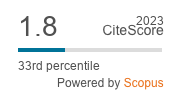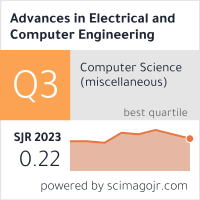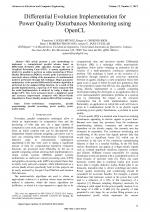| 2/2019 - 2 |
Differential Evolution Implementation for Power Quality Disturbances Monitoring using OpenCLSOLIS-MUNOZ, F. J. |
| View the paper record and citations in |
| Click to see author's profile in |
| Download PDF |
Author keywords
evolutionary computation, parallel programming, parallel processing, power quality, power system faults
References keywords
power(29), comput(14), optimization(13), quality(10), evolution(10), algorithm(10), systems(9), parallel(9), energy(9), soft(7)
Blue keywords are present in both the references section and the paper title.
About this article
Date of Publication: 2019-05-31
Volume 19, Issue 2, Year 2019, On page(s): 13 - 22
ISSN: 1582-7445, e-ISSN: 1844-7600
Digital Object Identifier: 10.4316/AECE.2019.02002
Web of Science Accession Number: 000475806300002
SCOPUS ID: 85066330466
Abstract
This article presents a new methodology to implement a computational parallel scheme based on Differential Evolution (DE) algorithm through the use of Graphical Processing Units (GPU). A system application in which it is possible to perform an online monitoring of Power Quality Disturbances (PQD) in electric grids is presented as a case study, where a fitting of the parameters of a mathematical model is performed through this technique. Hyper-parameter optimization of the parallel Differential Evolution algorithm is performed for the assigned fitting function. As a result of this parallel implementation, a speed-up of 37 times compared with the serial implementation is achieved by using a single low budget GPU. The work presented shows a significant speed and accuracy improvement compared with Micro-Genetic Algorithm for Power Quality Analysis (MGA-PQA) technique. |
| References | | | Cited By «-- Click to see who has cited this paper |
| [1] Y. Ma, X. Yu, and Y. Niu, "A parallel heuristic reduction based approach for distribution network fault diagnosis," Int. J. Electr. Power Energy Syst., vol. 73, pp. 548-559, Dec. 2015, [CrossRef] [Web of Science Times Cited 11] [SCOPUS Times Cited 12] [2] A. Delevacq, P. Delisle, M. Gravel, and M. Krajecki, "Parallel Ant Colony Optimization on Graphics Processing Units," J. Parallel Distrib. Comput., vol. 73, no. 1, pp. 52-61, Jan. 2013, [CrossRef] [Web of Science Times Cited 80] [SCOPUS Times Cited 100] [3] K. Luu, M. Noble, A. Gesret, N. Belayouni, and P.-F. Roux, "A parallel competitive Particle Swarm Optimization for non-linear first arrival traveltime tomography and uncertainty quantification," Comput. Geosci., vol. 113, pp. 81-93, Apr. 2018, [CrossRef] [Web of Science Times Cited 26] [SCOPUS Times Cited 37] [4] S. Iwata and Y. Fukuyama, "Verification of Dependability on Parallel Differential Evolution Based Voltage and Reactive Power Control," IFAC-PapersOnLine, vol. 49, no. 27, pp. 140-145, Jan. 2016, [CrossRef] [Web of Science Times Cited 1] [SCOPUS Times Cited 1] [5] P. Salmeron Revuelta, J. Prieto Thomas, and S. Perez Litran, Active power line conditioners: design, simulation and implementation for improving power quality. Academic Press, 2016. [6] M. A. S. Masoum and E. Fuchs, Power quality in power systems and electrical machines, 2nd ed. Academic Press/Elsevier, 2015. [7] S. Chattopadhyay, M. Mitra, and S. Sengupta, Electric power quality. Springer, 2011. [8] ***, Institute of Electrical and Electronics Engineers, "IEEE Std 1159-2009 (Revision of IEEE Std 1159-1995)." 2009, [CrossRef] [9] M. Naglic, L. Liu, I. Tyuryukanov, M. Popov, M. A. M. M. van der Meijden, and V. Terzija, "Synchronized measurement technology supported AC and HVDC online disturbance detection," Electr. Power Syst. Res., vol. 160, pp. 308-317, Jul. 2018, [CrossRef] [Web of Science Times Cited 4] [SCOPUS Times Cited 6] [10] M. Lopez-Ramirez, E. Cabal-Yepez, L. Ledesma-Carrillo, H. Miranda-Vidales, C. Rodriguez-Donate, and R. Lizarraga-Morales, "FPGA-Based Online PQD Detection and Classification through DWT, Mathematical Morphology and SVD," Energies, vol. 11, no. 4, p. 769, Mar. 2018, [CrossRef] [Web of Science Times Cited 15] [SCOPUS Times Cited 18] [11] O. P. Mahela and A. G. Shaik, "Recognition of power quality disturbances using S-transform based ruled decision tree and fuzzy C-means clustering classifiers," Appl. Soft Comput., vol. 59, pp. 243-257, Oct. 2017, [CrossRef] [Web of Science Times Cited 77] [SCOPUS Times Cited 100] [12] P. Kanirajan and V. Suresh Kumar, "Power quality disturbance detection and classification using wavelet and RBFNN," Appl. Soft Comput., vol. 35, pp. 470-481, Oct. 2015, [CrossRef] [Web of Science Times Cited 70] [SCOPUS Times Cited 104] [13] A. Y. Jaen-Cuellar, L. Morales-Velazquez, R. de J. Romero-Troncoso, D. Morinigo-Sotelo, and R. A. Osornio-Rios, "Micro-genetic algorithms for detecting and classifying electric power disturbances," Neural Comput. Appl., vol. 28, pp. 379-392, 2017, [CrossRef] [Web of Science Times Cited 9] [SCOPUS Times Cited 11] [14] W. Bozejko, M. Uchronski, and M. Wodecki, "Parallel metaheuristics for the cyclic flow shop scheduling problem," Comput. Ind. Eng., vol. 95, pp. 156-163, May 2016, [CrossRef] [Web of Science Times Cited 15] [SCOPUS Times Cited 16] [15] Z.-H. Hu, "Heuristics for solving continuous berth allocation problem considering periodic balancing utilization of cranes," Comput. Ind. Eng., vol. 85, pp. 216-226, Jul. 2015, [CrossRef] [Web of Science Times Cited 11] [SCOPUS Times Cited 18] [16] T. Dokeroglu, "Hybrid teaching-learning-based optimization algorithms for the Quadratic Assignment Problem," Comput. Ind. Eng., vol. 85, pp. 86-101, Jul. 2015, [CrossRef] [Web of Science Times Cited 65] [SCOPUS Times Cited 81] [17] W. Niu, Z. Feng, C. Cheng, and X. Wu, "A parallel multi-objective particle swarm optimization for cascade hydropower reservoir operation in southwest China," Appl. Soft Comput., vol. 70, pp. 562-575, Sep. 2018, [CrossRef] [Web of Science Times Cited 91] [SCOPUS Times Cited 101] [18] D. R. Penas, J. R. Banga, P. Gonzalez, and R. Doallo, "Enhanced parallel Differential Evolution algorithm for problems in computational systems biology," Appl. Soft Comput., vol. 33, pp. 86-99, Aug. 2015, [CrossRef] [Web of Science Times Cited 39] [SCOPUS Times Cited 46] [19] D. M. Pedroso, M. R. Bonyadi, and M. Gallagher, "Parallel evolutionary algorithm for single and multi-objective optimisation: Differential evolution and constraints handling," Appl. Soft Comput., vol. 61, pp. 995-1012, Dec. 2017, [CrossRef] [Web of Science Times Cited 26] [SCOPUS Times Cited 31] [20] P. Nejedly, F. Plesinger, J. Halamek, and P. Jurak, "CudaFilters: A SignalPlant library for GPU-accelerated FFT and FIR filtering," Softw. Pract. Exp., vol. 48, no. 1, pp. 3-9, Jan. 2018, [CrossRef] [Web of Science Times Cited 6] [SCOPUS Times Cited 8] [21] G. Zhou et al., "A novel GPU-accelerated strategy for contingency screening of static security analysis," Int. J. Electr. Power Energy Syst., vol. 83, pp. 33-39, 2016, [CrossRef] [Web of Science Times Cited 26] [SCOPUS Times Cited 31] [22] S. Luthra, "High Level Synthesis and Evaluation of an Automotive RADAR Signal Processing algorithm for FPGAs," University of Windsor, 2017. [23] C. Liu, R. Ma, H. Bai, F. Gechter, and F. Gao, "A new approach for FPGA-based real-time simulation of power electronic system with no simulation latency in subsystem partitioning," Int. J. Electr. Power Energy Syst., vol. 99, pp. 650-658, 2018, [CrossRef] [Web of Science Times Cited 34] [SCOPUS Times Cited 36] [24] M. S. Ben Ameur and A. Sakly, "FPGA based hardware implementation of Bat Algorithm," Appl. Soft Comput., vol. 58, pp. 378-387, Sep. 2017, [CrossRef] [Web of Science Times Cited 25] [SCOPUS Times Cited 31] [25] H. Setiadi, A. U. Krismanto, N. Mithulananthan, and M. J. Hossain, "Modal interaction of power systems with high penetration of renewable energy and BES systems," Int. J. Electr. Power Energy Syst., vol. 97, pp. 385-395, 2018, [CrossRef] [Web of Science Times Cited 39] [SCOPUS Times Cited 54] [26] M. Singh, V. Telukunta, and S. G. Srivani, "Enhanced real time coordination of distance and user defined over current relays," Int. J. Electr. Power Energy Syst., vol. 98, pp. 430-441, 2018, [CrossRef] [Web of Science Times Cited 24] [SCOPUS Times Cited 33] [27] H. M. G. C. Branco, M. Oleskovicz, D. V. Coury, and A. C. B. Delbem, "Multiobjective optimization for power quality monitoring allocation considering voltage sags in distribution systems," Int. J. Electr. Power Energy Syst., vol. 97, pp. 1-10, Apr. 2018, [CrossRef] [Web of Science Times Cited 25] [SCOPUS Times Cited 36] [28] P. Baraldi, G. Bonfanti, and E. Zio, "Differential evolution-based multi-objective optimization for the definition of a health indicator for fault diagnostics and prognostics," Mech. Syst. Signal Process., vol. 102, pp. 382-400, Mar. 2018, [CrossRef] [Web of Science Times Cited 79] [SCOPUS Times Cited 91] [29] M. Z. Baig, N. Aslam, H. P. H. Shum, and L. Zhang, "Differential evolution algorithm as a tool for optimal feature subset selection in motor imagery EEG," Expert Syst. Appl., vol. 90, pp. 184-195, Dec. 2017, [CrossRef] [Web of Science Times Cited 110] [SCOPUS Times Cited 134] [30] M. Pal and S. Bandyopadhyay, "Many-objective feature selection for motor imagery EEG signals using differential evolution and support vector machine," in 2016 International Conference on Microelectronics, Computing and Communications (MicroCom), 2016, pp. 1-6, [CrossRef] [SCOPUS Times Cited 19] [31] T. Niu, J. Wang, K. Zhang, and P. Du, "Multi-step-ahead wind speed forecasting based on optimal feature selection and a modified bat algorithm with the cognition strategy," Renew. Energy, vol. 118, pp. 213-229, Apr. 2018, [CrossRef] [Web of Science Times Cited 92] [SCOPUS Times Cited 104] [32] E. Osaba, F. Diaz, E. Onieva, R. Carballedo, and A. Perallos, "AMCPA: A population metaheuristic with adaptive crossover probability and multi-crossover mechanism for solving combinatorial optimization problems," Int. J. Artif. Intell., vol. 12, no. 2, pp. 1-23, 2014. [33] W. He, Q. Miao, M. Azarian, and M. Pecht, "Health monitoring of cooling fan bearings based on wavelet filter," Mech. Syst. Signal Process., vol. 64-65, pp. 149-161, Dec. 2015, [CrossRef] [Web of Science Times Cited 46] [SCOPUS Times Cited 58] [34] K. Y. Chan, T. S. Dillon, and E. Chang, "An Intelligent Particle Swarm Optimization for Short-Term Traffic Flow Forecasting Using on-Road Sensor Systems," IEEE Trans. Ind. Electron., vol. 60, no. 10, pp. 4714-4725, Oct. 2013, [CrossRef] [Web of Science Times Cited 69] [SCOPUS Times Cited 79] [35] R.-C. David, R.-E. Precup, E. M. Petriu, M.-B. Radac, and S. Preitl, "Gravitational search algorithm-based design of fuzzy control systems with a reduced parametric sensitivity," Inf. Sci. (Ny)., vol. 247, pp. 154-173, Oct. 2013, [CrossRef] [Web of Science Times Cited 71] [SCOPUS Times Cited 89] [36] J. Saadat, P. Moallem, and H. Koofigar, "Training Echo State Neural Network Using Harmony Search Algorithm," Int. J. Artif. Intell., vol. 15, no. 1, pp. 136-179, 2017. [37] I. Sillitoe, M. Button, and E. Owhonda, "An Intelligent, multi-transducer signal conditioning design for manufacturing applications," Robot. Comput. Integr. Manuf., vol. 47, pp. 61-69, Oct. 2017, [CrossRef] [Web of Science Times Cited 2] [SCOPUS Times Cited 3] [38] Y. Kabalci, S. Kockanat, and E. Kabalci, "A modified ABC algorithm approach for power system harmonic estimation problems," Electr. Power Syst. Res., vol. 154, pp. 160-173, Jan. 2018, [CrossRef] [Web of Science Times Cited 46] [SCOPUS Times Cited 61] [39] M. Seera, C. P. Lim, C. K. Loo, and H. Singh, "A modified fuzzy min-max neural network for data clustering and its application to power quality monitoring," Appl. Soft Comput., vol. 28, pp. 19-29, Mar. 2015, [CrossRef] [Web of Science Times Cited 38] [SCOPUS Times Cited 45] [40] ***, CENELEC, "EN 50160: Voltage characteristics of electricity supplied by public distribution systems." 2015. [41] M. A. Rodriguez-Guerrero, R. Carranza-Lopez-Padilla, R. A. Osornio-Rios, and R. de J. Romero-Troncoso, "A novel methodology for modeling waveforms for power quality disturbance analysis," Electr. Power Syst. Res., vol. 143, pp. 14-24, Feb. 2017, [CrossRef] [Web of Science Times Cited 28] [SCOPUS Times Cited 33] [42] M. A. Rodriguez-Guerrero, A. Y. Jaen-Cuellar, R. D. Carranza-Lopez-Padilla, R. A. Osornio-Rios, G. Herrera-Ruiz, and R. de J. Romero-Troncoso, "Hybrid Approach based on GA and PSO for Parameter Estimation of a Full Power Quality Disturbance Parameterized Model," IEEE Trans. Ind. Informatics, pp. 1-1, Aug. 2017, [CrossRef] [Web of Science Times Cited 36] [SCOPUS Times Cited 44] [43] B. Xie, S. Gong, and G. Tan, "LiPro: light-based indoor positioning with rotating handheld devices," Wirel. Networks, vol. 24, no. 1, pp. 49-59, Jan. 2018, [CrossRef] [Web of Science Times Cited 11] [SCOPUS Times Cited 15] [44] H. A. Kloub and F. Alkhatib, "Impact of increased deployment of distributed photovoltaic systems on power grid in Jordan challenges and potential solutions," in 2017 10th Jordanian International Electrical and Electronics Engineering Conference (JIEEEC), 2017, pp. 1-4, [CrossRef] [SCOPUS Times Cited 3] [45] R. Storn and K. Price, "Differential Evolution - A Simple and Efficient Heuristic for global Optimization over Continuous Spaces," J. Glob. Optim., vol. 11, no. 4, pp. 341-359, 1997, [CrossRef] [Web of Science Times Cited 17892] [SCOPUS Times Cited 22585] [46] K. V. Price, R. M. Storn, and J. A. Lampinen, Differential evolutionâ¯: a practical approach to global optimization. Springer, 2005. [47] V. Feoktistov, Differential Evolution: In Search of Solutions. Springer US, 2006, [CrossRef] [48] H. Maaranen, K. Miettinen, and A. Penttinen, "On initial populations of a genetic algorithm for continuous optimization problems," J. Glob. Optim., vol. 37, no. 3, pp. 405-436, Jan. 2007, [CrossRef] [Web of Science Times Cited 112] [SCOPUS Times Cited 134] [49] W. F. Sacco and A. C. Rios-Coelho, "On Initial Populations of Differential Evolution for Practical Optimization Problems," in Computational Intelligence, Optimization and Inverse Problems with Applications in Engineering, Cham: Springer International Publishing, 2019, pp. 53-62, [CrossRef] [SCOPUS Times Cited 7] [50] L. H. B. Liboni, M. C. de Oliveira, and I. N. da Silva, "On the problem of optimal estimation of balanced and symmetric three-phase signals," Int. J. Electr. Power Energy Syst., vol. 91, pp. 155-165, 2017, [CrossRef] [Web of Science Times Cited 7] [SCOPUS Times Cited 6] [51] M. A. Rodriguez-Guerrero, R. Carranza-Lopez-Padilla, R. A. Osornio-Rios, and R. de J. Romero-Troncoso, "A novel methodology for modeling waveforms for power quality disturbance analysis," Electr. Power Syst. Res., vol. 143, pp. 14-24, Feb. 2017, [CrossRef] [Web of Science Times Cited 28] [SCOPUS Times Cited 33] Web of Science® Citations for all references: 19,386 TCR SCOPUS® Citations for all references: 24,454 TCR Web of Science® Average Citations per reference: 373 ACR SCOPUS® Average Citations per reference: 470 ACR TCR = Total Citations for References / ACR = Average Citations per Reference We introduced in 2010 - for the first time in scientific publishing, the term "References Weight", as a quantitative indication of the quality ... Read more Citations for references updated on 2024-07-26 10:28 in 288 seconds. Note1: Web of Science® is a registered trademark of Clarivate Analytics. Note2: SCOPUS® is a registered trademark of Elsevier B.V. Disclaimer: All queries to the respective databases were made by using the DOI record of every reference (where available). Due to technical problems beyond our control, the information is not always accurate. Please use the CrossRef link to visit the respective publisher site. |
Faculty of Electrical Engineering and Computer Science
Stefan cel Mare University of Suceava, Romania
All rights reserved: Advances in Electrical and Computer Engineering is a registered trademark of the Stefan cel Mare University of Suceava. No part of this publication may be reproduced, stored in a retrieval system, photocopied, recorded or archived, without the written permission from the Editor. When authors submit their papers for publication, they agree that the copyright for their article be transferred to the Faculty of Electrical Engineering and Computer Science, Stefan cel Mare University of Suceava, Romania, if and only if the articles are accepted for publication. The copyright covers the exclusive rights to reproduce and distribute the article, including reprints and translations.
Permission for other use: The copyright owner's consent does not extend to copying for general distribution, for promotion, for creating new works, or for resale. Specific written permission must be obtained from the Editor for such copying. Direct linking to files hosted on this website is strictly prohibited.
Disclaimer: Whilst every effort is made by the publishers and editorial board to see that no inaccurate or misleading data, opinions or statements appear in this journal, they wish to make it clear that all information and opinions formulated in the articles, as well as linguistic accuracy, are the sole responsibility of the author.





